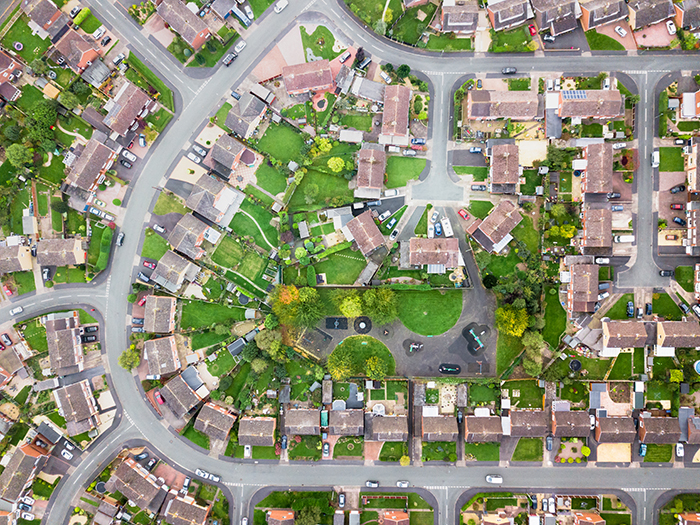
House prices declined 1.1% on an annual basis in February, the latest data from Nationwide reveals.
Annual house price growth has now slipped into negative territory for the first time since June 2020 and this new data marks the weakest performance recorded since November 2012.
On a monthly basis, house prices dipped by 0.5% with prices – the sixth consecutive fall. This leaves house prices 3.7% lower than the August peak in 2022.
According to the lender, the latest average house price is £257,406, down from £258,297 in January.
Nationwide chief economist Robert Gardner explains that the recent run of weak house price data began with the financial market turbulence in response to the mini-Budget at the end of September last year.
He suggests that while financial market conditions normalised some time ago, housing market activity has remained subdued.
Gardner says: “This likely reflects the lingering impact on confidence as well as the cumulative impact of the financial pressures that have been weighing on households for some time. Indeed, inflation has continued to outpace wage growth and mortgage rates remain significantly higher than the lows recorded in 2021.”
“Even though consumer sentiment has improved in recent months, it is still languishing at levels prevailing during the depths of the financial crisis.”
The chief economist suggests it will be “hard for the market to regain much momentum in the near term since economic headwinds look set to remain relatively strong, with the labour market widely expected to weaken as the economy shrinks in the quarters ahead, while mortgage rates remain well above the lows prevailing in 2021”.
Despite the modest fall in house prices, he says for a prospective first-time buyer earning the average income looking to buy the typical home, mortgage payments remain “well above the long-run average as a share of take-home pay”.
“In addition, deposit requirements remain prohibitively high for many and saving for a deposit remains a struggle given the rising cost of living, especially for those in the private rented sector, where rents have been rising strongly.”
However, Gardner explains that conditions “should gradually improve” if inflation moderates in the coming months as expected, easing pressure on household budgets.
“Solid gains in nominal incomes together with weak or declining house prices will also support housing affordability, especially if mortgage rates edge lower in the coming months.”
Meanwhile, SlothMove chief executive Jack Roberts comments: “In the short term, the move to negative annual growth could be the shock to the system needed to bring more buyers and sellers to the table.”
“Many first-time buyers will see it as their window of opportunity opening, giving them a limited time to swoop before the market rights itself. Their biggest hurdle, as ever, will be the affordability gap, but with rents increasing and borrowing levels relatively settled, it could be their moment.”
“Meanwhile, for some sellers keen to cling onto gains made during the pandemic, or facing a costly remortgaging, the downward arrow may spur them to reduce their asking prices and make a deal happen in 2023.”
PAB Wealth Management mortgage adviser Luke Thompson states: “Despite the fact this data paints an ominous picture, demand was fairly strong in February and was definitely busier than we saw at the end of 2022 and in January.”
Thompson suggests there has been a “correction” in the market, as buyers are more aware that monthly payments will be higher than this time last year, which has led to them being more cautious when making an offer on a property.
“Sellers have had to become more accustomed to the fact that they may not achieve the full asking price for their property as we aren’t seeing multiple people bidding for a property like we were at the end of 2021 and into 2022.”
“If the base rate falls later in the year, I think it will stimulate some demand and help to keep house prices higher. But borrowers need to be aware that we aren’t returning to the ultra-low interest rates we have seen since the Global Financial Crisis of 2008.”
The Mortgage Hut managing director Nicola Schutrups says that her team saw a “bounce in enquiries” from new and existing customers looking to secure a mortgage in February.
“New purchases have most certainly increased, with a near 100% increase on Q4 2022. Very much like during Covid and Brexit, we’ve seen resilience in our clients and an adjustment in customers’ expectations towards rates and monthly payments.”
Schutrups says while she doesn’t believe the base rate will come down this year, with energy costs and other key inflationary pressures reducing, she believes “the pressure is reducing on consumers”.
SPF Private Clients chief executive Mark Harris adds: “Average property prices fell in February as higher mortgage costs, along with the rising cost of living, have an inevitable impact on affordability.”
“Swap rates, which underpin the pricing of fixed-rate mortgages and have been falling since the turmoil created by the mini-Budget in September, have taken a turn and moved the other way in the past couple of weeks on the back of expectations of further base rate rises.”
“Subsequently, several lenders who launched sub-4% five-year fixed-rate mortgages have since increased these, with mortgage rates likely to be up and down in coming weeks.”



